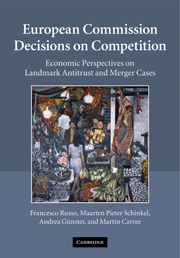 European Commission Decisions on Competition
European Commission Decisions on Competition Published online by Cambridge University Press: 04 August 2010
An active protection of competition in and across Member States was recognized in the Treaty of Rome of 1957 as an important fundament for a unified European Economic Community (EEC). The importance of economic analysis in European competition policy has increased over the history of its enforcement. European competition law enforcement is an active area where law and economics meet. This book presents a systematic analysis and classification of all formal decisions adopted by the European Commission in antitrust cases between 1962, when European competition policy became effective, due to the adoption of Regulation 17, and 2009. Included are all Commission decisions pursuant to Articles 101 (agreements and concerted practices), 102 (abuse of dominance), and 106 (special or exclusive rights granted to undertakings by Member States) of the Treaty on the Functioning of the European Union (FEU Treaty). The book also contains a chapter on mergers and acquisitions (M&As) landmark cases dealt with by the European Commission. Finally, the book lists the decisions the Commission adopted in case of lack of due cooperation by the undertakings involved in antitrust proceedings.
The leading principle in classifying and presenting the decisions in this book is the economic issue central to a case. We have drawn up an extensive list of mainstream economic theories of anticompetitive behavior, and describe the first and landmark European Commission decision in which that type of behavior was at the core of the analysis. This book brings together “economic landmark cases.”
To save this book to your Kindle, first ensure no-reply@cambridge.org is added to your Approved Personal Document E-mail List under your Personal Document Settings on the Manage Your Content and Devices page of your Amazon account. Then enter the ‘name’ part of your Kindle email address below. Find out more about saving to your Kindle.
Note you can select to save to either the @free.kindle.com or @kindle.com variations. ‘@free.kindle.com’ emails are free but can only be saved to your device when it is connected to wi-fi. ‘@kindle.com’ emails can be delivered even when you are not connected to wi-fi, but note that service fees apply.
Find out more about the Kindle Personal Document Service.
To save content items to your account, please confirm that you agree to abide by our usage policies. If this is the first time you use this feature, you will be asked to authorise Cambridge Core to connect with your account. Find out more about saving content to Dropbox.
To save content items to your account, please confirm that you agree to abide by our usage policies. If this is the first time you use this feature, you will be asked to authorise Cambridge Core to connect with your account. Find out more about saving content to Google Drive.